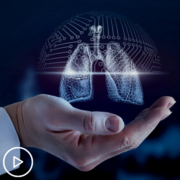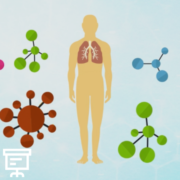Are Clinical Trials Too Risky? A Lung Cancer Expert Reviews the Facts.
Are Clinical Trials Too Risky? A Lung Cancer Expert Reviews the Facts. from Patient Empowerment Network on Vimeo.
Some patients fear that clinical trials may be too experimental and risky. Dr. Martin Edelman outlines the clinical trial process and addresses myths surrounding trials. Want to learn more? Download the Program Resource Guide here.
Dr. Martin J. Edelman is Chair of the Department of Hematology/Oncology and Deputy Director for Clinical Research at Fox Chase Cancer Center. More about this expert here.
View more from Fact or Fiction? Lung Cancer
Related Programs:

How Genetic Testing Has Revolutionized Lung Cancer Treatment |

|

|
Transcript:
Patricia:
Here’s the last one that I have on my list here. Clinical trials are experimental and risky.
Dr. Edelman:
Yeah. Well, so is the rest of life. So, there generally – is there risk? Yes. Essentially, every patient is always a trial because we for the most part don’t – even in the disease states where we have very active treatment – so, let’s say – for example, we were talking about the EGFR mutation. So, we have excellent drugs. We have a drug now, osimertinib – outstanding drug, easy to take, low risk of side effects.
The earlier generations – there was a lot of rash, diarrhea. That’s been pretty much done away with. But on average, patients benefit from this drug for about a year and a half.
So, that’s not great if you’re 40 or 50 years old. You want to do better. So, what are our current studies? Well, we’re looking – we’re re-addressing a question that we thought had been answered, but really it wasn’t – about, well, what’s the value of chemotherapy plus this drug? What about the value of other drugs?
So, we can’t promise anybody anything, but our current treatments are still not good enough. There are certain diseases, let’s say Hodgkin’s disease, where you know you’re gonna cure almost all the patients up front or testicular cancer, etcetera, where – again, but thanks to trials, clinical trials, we now are at that stage. We’re not there yet in lung cancer, and the reality is is every patient should really be on a study. I think it’s – and we have this problem now in that our studies have also become far more complicated to enter people in because there are many more variables one has to look at it. What’s the molecular background of the tumor? How many prior therapies?
The condition of the patient, their organ function, etcetera – and the regulatory burden has become much, much greater. But clinical patients are in clinical trials. Let’s look at the question. Are they risky? Well, everything is risky, but we do a lot to manage that risk. Patients who are in studies are observed more closely. We have to. It’s the law. There’s frequently additional personnel assigned. They’re usually getting standard of care plus a new treatment or a new treatment followed by the standard of care or some variation of that.
They’re observed, like I said, much more carefully than we would otherwise. And so, I think actually patients on trials generally will do better, and we actually have evidence. Multiple individuals have looked at this – everything from first-in-man trials or early dose escalation studies, controlled studies – that show that patients, even those on the control arm, generally do better than similar types of patients who are not treated on studies because we just are more careful.
And the physician who participates in trials is generally someone who has a greater knowledge of the disease.






